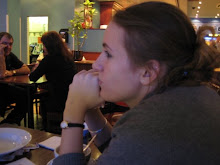Back at Oxford I am. After a glorious Christmas with family (though missing the gametrekkers). A live Christmas tree (with glowing shells), the glory of the Pacific coastline, crackling fires, cookies and goodies galore, and, most wondrous of all, the bright warmth of family -- grandmothers, brothers, parents. How I love them all.
And then New Year's in Minnesota with lots of cousins, aunts, uncles, and the hardest puzzle I've ever encountered.
All while reading Icelandic sagas and NOT writing my theory essay.
But now I am back. In an empty room and an empty apartment, with jet-lag, lovely memories, and the need to get back to work. Hard work, and really fast. I have Icelandic history to read (lots of it), Sagas to plot out (a necessity, since there are so many names I can't keep track of what happens from chapter to chapter, much less book to book), dissertations to plan (along with people to meet with), and, most dreaded of all, a theory essay to write (with all the reading that goes with it). So I probably won't get around to writing that PhD/DPhil proposal and applying to programs. But oh well. I think I need another year anyway. To read and think and really know what I'm planning.
But if the essay ever gets written, and a decision on a dissertation topic and adviser is ever made, then I'll have to admit that I'm excited about what comes next. About getting back to literature. About building arguments from the texts of stories. About learning about Iceland. Though this year is making me wish, SO strongly, that I had more/stronger languages. Norse, Old English, Middle English, French, and yes, a better reading knowledge of Arabic. What I wouldn't give to float effortlessly through Medieval (and modern) texts that now I'm not allowed to touch, or must access through mediation.
And these sagas burn with tales of betrayal and revenge. Friendships destroyed. Blood-ties honored. Loyalty torn. And in the middle the women hover, egging on their husbands, brothers, uncles, to blood-lust and manhood, often at the cost of their own happiness and their men's lives.
And I find it interesting that these stories, of heathen faith and legendary courage, black magic and violent deeds, are mediated through a Christian era. The old gods, it seems, may be rejected but they are never doubted. Thangbrand, King Olaf's missionary to Iceland, tells the people, not that Thor is an illusion, but that without God's will he would never have lived in the first place. And the gospel is spread with both "fair words and dire punishments" (The Saga of the People of Laxardal). God proves himself (for, indeed, the God of the Icelanders is certainly male) with heathen miracles and proofs of power. The ministry of incarnation amongst a culture bound to the heroic code? Who's to say? For isn't this the same God that once ordered the butchering of men, women, and children, proving to surrounding nations that the God of Israel was strong?
But there are hints of another way. Hauskuld, who declares that even if it were true that his foster brothers have been treacherous, he would still "far rather suffer death at their hands than work them any harm" (Njal's Saga). Or Njal himself, the seeker of peaceful restitution, who refuses to shed blood and thinks of the new religion, when it comes, that here at last is a way to God.
Practices for Disturbing Times
4 years ago



1 comment:
I should read this literature myself. Interesting example of the intersection of "global" and "contextual," as some have coined the terms - the "global" coming into a local context, being understoon in the language of the people (the only language and concepts they know). Faith in cultural context. Keep writing about these interesting things you're discovering...
Post a Comment